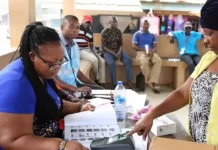
By Sheila WILLIAMS
The Bank of Ghana (BoG) has reduced its policy rated by 100 basis points to 16
per cent. The action was largely due to a downward decline in inflationary
pressures.
The rate at which banks borrow from Bank of Ghana, is known as Policy Rate.
The current policy rate will now be expected to serve as a guide in the setting
of interest rates in the first quarter of 2019.
The Governor of the Central Bank of Ghana, Dr. Ernest Addison, announced the
reduction in the bank’s benchmark rate after a successful 86th Monetary Policy
Committee (MPC) meeting held in Accra recently.
Explanation for Decision
Presenting the highlights of recent economic developments that have shaped the
Committee’s decision, Dr. Addison noted the immediate risks to the disinflation
path were well contained and that provided scope to translate some of the gains
in the macro stability to the economy.
The Monetary Policy Committee also noted that inflation has steadily declined
from 15.4 percent at the end of 2016, to 11.8 percent in 2017 and further down
to 9.4 percent in 2018, supported in large part by non-food inflation.
The Bank’s latest forecast shows that inflation will remain within the target
band of 8+2 percent over the forecast horizon, barring any unanticipated
shocks.
The Banking Sector
The year 2018 ended on a strong note with the bank’s reforms and
recapitalization exercise with a total of 23 banks meeting the minimum
requirement. These banks are sound, liquid and well- capitalized, and
well-positioned to translate the gains made so fat from two years of far-
reaching reforms to the rest of the economy.
At the end the recapitalization exercise, a total assets of the banking sector
grew by 14.7 percent year-on year to GHC107.3 billion, meanwhile growth in
industry assets is expected to rebound as banks deploy their newly capital
towards financial intermediation.
This enhanced the efficiency and profitability of the remaining banks and has
restored confidence and resilience in the banking sector, with the banks now
better positioned to support private sector led growth in the Ghanaian economy.


























